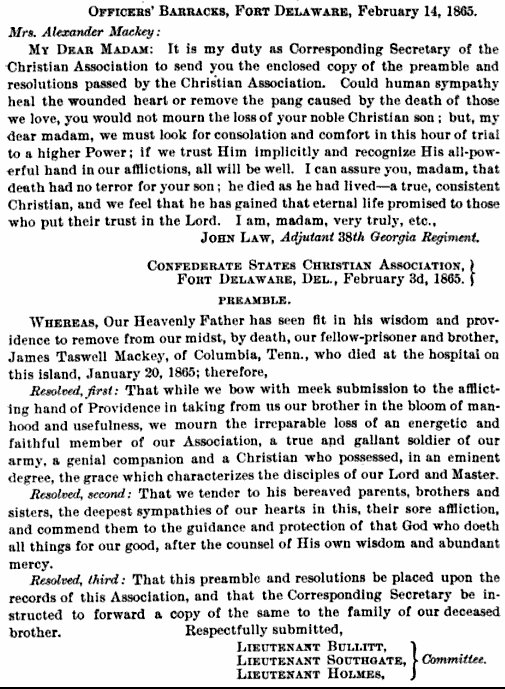Rev. John Gordon Law, the son of Dr. John S. Law and Sarah “Sallie” Chapman Gordon Law, grandson of Benjamin Law, and nephew of Judge William Law, of Liberty County, Georgia, was born in Columbia, Tennessee, September 14, 1839; his father leaving Liberty County, practiced medicine awhile in Forsyth, Georgia; afterwards removed to Columbia, Tennessee, where he became ruling elder; his mother was Sarah Gordon, the aunt of General John B. Gordon.
At the oubreak of the Civil War he was a student of medicine at Memphis Medical College. He enlisted in the Hickory Rifles, which became part of the 154th Tennessee Regiment. He was wounded at the battle of Shiloh, and at the battle of Perryville, Kentucky, his overcoat was shot through with ten rifle balls, though he was unharmed. He served as a private till the battle of Chickamauga, when appointed adjutant of the 38th Georgia Regiment. He traveled to Virginia to join his new command. While serving as the regimental Adjutant of the 38th he was captured at the battle of Spotsylvania Court House, on May 10th, 1864. General John B. Gordon describes the incident of his capture in his book “Reminiscences of the Civil War.”
General Gordon recalled:
As Hancock's troops were driven out of our lines on the morning of the 12th, the commander of one of my regiments, Colonel Davant of the Thirty-eighth Georgia, became so enthused that he ran in pursuit ahead of his men, and passed some distance beyond the breastworks. A squad of Hancock's retreating men at once halted, and, in the quaint phraseology of the army, "quietly took him in." Davant, surprised to find himself in the hands of Hancock's bluecoats instead of in the company of his Confederate comrades, attempted to give notice to his men in the rear that he was captured. His adjutant, John Gordon Law, my first cousin, heard the colonel's call, and sprang forward through the thicket to aid him. Law was likewise captured, and was kept in prison to the end of the war.
He is now a prominent minister of the Presbyterian Church, and delights to tell of the great kindness shown him by the guard to whose care he was assigned. The soldier in blue who guarded Law was a private, and had no possible use for a swordbelt; but he wanted it, nevertheless. Instead of taking it forcibly, he paid for it, in greenbacks, the full price named by Law. In answer to Law's lament that he was going to prison without a change of clothing or any blankets, this generous Union boy offered to sell him his own blankets. Law replied to the suggestion: "I have no money to pay you for your blankets, except Confederate bills and the greenbacks which you have just paid me for the swordbelt." "Oh, well," said the Federal private, " you can pay me for the blankets in Confederate money, and if I should be captured it will answer my purpose. If I should not be captured I will not need the money. Give me your 'graybacks' and you keep my 'greenbacks' to help you along during your stay in Fort Warren."
John Law was confined at Fort Delaware and while there served on the staff of the prison newspaper as Recording Secretary. He also served as the Secretary of the Confederate States of the Christian’s Association at Ft. Delaware. Below is a letter he wrote as a tribute to the family of a soldier who had died in prison:

He was released from prison on June 15, 1865 and returned to Georgia.
He entered the Columbia Seminary and graduated in 1870; licensed by Presbytery of Memphis June 10, 1869, and spent the summer in missionary work in Paducah Presbytery; married that year to Margaret C. Kyle; after completing the course at Columbia, went abroad, spending a winter at the University of Edinburgh, and part of the following winter at the Assembly's college in Belfast, Ireland, where their daughter, Mary was born; returning to American in 1872, accepted the call to Walhalla, South Carolina, where he was ordained by the Presbytery of South Carolina September 23, 1873; on account of failing health of his wife, resigned his charge at Walhalla in 1876, and again went abroad, a son, John Gordon Law, Jr., was born in England in 1878; returning in 1878, and doing evangelistic work until January 1, 1879, when he accepted an invitation to supply the Circular Church of Charleston, South Carolina, which place he filled until May, 1879, when he became pastor of the Church at Darlington, South Carolina, where he remained until October 1st, when he accepted a call to Ocala, Florida. After the death of his wife, he married Alice E. ____ in 1899 and they were living in Wagener, South Carolina in the 1900 US Census. Rev. John Gordon Law died in Wagener, Oconee County, South Carolina March 29, 1916.
Source: "History of the Midway Congregational Church" page 161
Genealogy of the Lewis family in America. The James Mackey Letter of Tribute
"Joseph Law Family Tree" compiled by Benjamin Palmer Axson July 15th, 1927.
“REMINISCENCES OF THE CIVIL WAR” by General John B. Gordon
"Reminiscences of the War of the Sixties Between the North and South" by Mrs. S. C. Law, President of the Southern Mother's Hospital Association, 1892. (John G. Law's mother)